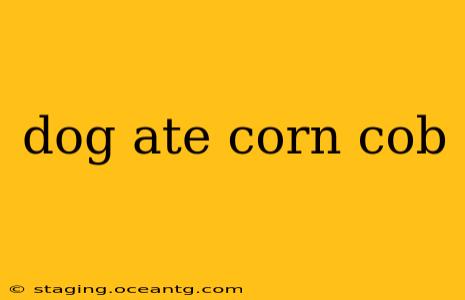Finding a discarded corn cob in your trash can and realizing your dog has been snacking on it is a common—and concerning—scenario for many pet owners. Corn cobs, while seemingly harmless, present a significant choking and intestinal blockage hazard to dogs. This article will guide you through what to do if your dog ate a corn cob, explaining the risks, symptoms to watch for, and when veterinary intervention is crucial.
What Happens If a Dog Eats a Corn Cob?
The primary danger of a dog eating a corn cob lies in its potential to cause a gastrointestinal obstruction (GI obstruction). Corn cobs are indigestible and, depending on the size of the dog and the size of the cob, can get lodged in the esophagus, stomach, or intestines. This blockage can lead to:
- Vomiting: Your dog may vomit repeatedly, often with little or no food present.
- Diarrhea: This can sometimes be accompanied by blood or mucus.
- Lethargy and Weakness: Your dog may appear unusually tired or weak.
- Loss of Appetite: A decrease or complete loss of interest in food is a major red flag.
- Abdominal Pain: Your dog may exhibit signs of discomfort, such as whining, whimpering, or guarding its abdomen.
- Constipation: The inability to pass stool is a clear indication of a blockage.
- Dehydration: Due to vomiting and diarrhea, your dog may become dehydrated.
In severe cases, a complete intestinal blockage can lead to serious complications, including sepsis (a life-threatening infection), perforation (a hole in the intestinal wall), and even death if left untreated.
How Do I Know If My Dog Needs a Vet?
While some small pieces of corn cob might pass through your dog's system without incident, it's crucial to monitor your pet closely. Always contact your veterinarian if your dog has eaten a corn cob. Even small pieces can cause problems.
Here's a breakdown of when immediate veterinary attention is required:
- Your dog is showing any of the symptoms listed above. Even mild symptoms warrant a call to your vet.
- You witnessed your dog eating a large piece of corn cob. The size of the cob relative to your dog is a key factor. Larger dogs might tolerate smaller cobs, but it's still risky.
- Your dog is exhibiting signs of distress, such as excessive panting, restlessness, or whimpering.
- You are unsure if your dog swallowed the entire corn cob. It's better to err on the side of caution.
What Will the Vet Do?
Your veterinarian will perform a physical examination and might order some diagnostic tests, such as X-rays or an ultrasound, to determine the location of the corn cob and the extent of any blockage. Depending on the situation, treatment might include:
- Monitoring: If the cob is small and your vet believes it will pass naturally, they may recommend close monitoring at home.
- Induced Vomiting: If the cob was recently ingested, your vet might induce vomiting.
- Surgery: In most cases of corn cob ingestion, surgery is necessary to remove the obstruction. This is especially true if the cob has caused a blockage or perforation.
My Dog Ate a Corn Cob, But Seems Fine - Should I Still Worry?
Even if your dog appears perfectly healthy after eating a corn cob, it's still wise to monitor them closely. Symptoms may not develop immediately. Keep a close eye on their bowel movements and contact your vet if you notice anything unusual.
Can I Prevent My Dog From Eating Corn Cobs?
The best course of action is prevention. Keep corn cobs and other potential hazards out of your dog's reach. Properly dispose of corn cobs in securely sealed trash cans. Supervise your dog closely, particularly when eating outside or near areas where corn might be present. Train your dog to leave things alone using positive reinforcement methods.
This information is for general knowledge and does not substitute professional veterinary advice. Always consult with your veterinarian if you have concerns about your pet's health. Early intervention is crucial in cases of foreign body ingestion.
